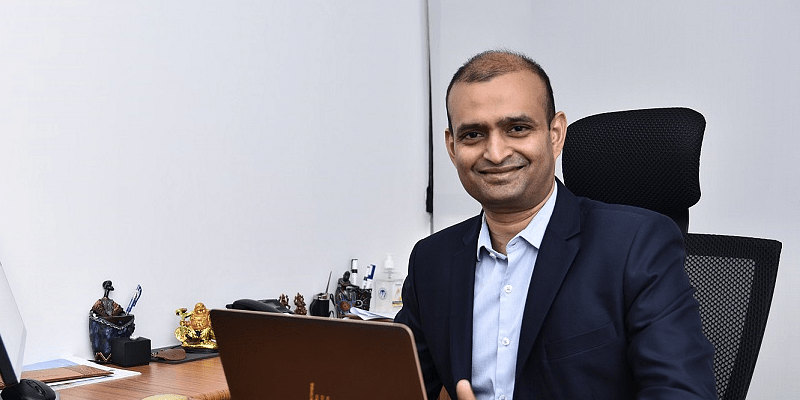When the pandemic first hit India in 2020, law firm Lexygen announced its COVID Pledge to donate approximately $70,000 or Rs 50 lakh worth of legal advice to a mix of startups and later-stage Indian businesses. This year, in the wake of the second wave of the pandemic, the COVID Pledge 2.0 has been increased to $150,000 or Rs 1.10 crore of legal advice.
Vijay Sambamurthi, Founder and Managing Partner, Lexygen, joins us in this interview on the legal pain faced by startups, how the company’s pledge can help them, and words of advice for founders in a time of crisis.
Edited excerpts of the interview below:
YourStory [YS]: Tell us a bit about Lexygen – your founding vision, achievements so far, and plans ahead.
Vijay Sambamurthi [VS]: Lexygen is a law firm I founded in 2006, after having spent a decade in the legal profession. We are based in Bengaluru, but have a truly pan-Indian focus. We provide legal advisory services in the areas of fund formation, VC/PE investments and fundraisings, mergers and acquisitions, technology, intellectual property, and general corporate advisory.
My vision in founding Lexygen was to build an organisation that emerges as a breath of fresh air in the way legal services are provided in India – in fact, our name “Lexygen”, is an amalgam of “Lex” (which means Law in Latin) and “Oxygen”, and signifies this founding vision. Over the past decade and a half, we have built a strong reputation for legal advice and service, domain knowledge, client-centric approach, and professional conduct. We have also won numerous awards recognising our quality of advice and service.
Whether it be fast-growing startups or huge corporations, early-stage VC funds or later-stage and buyout PE funds, government agencies and other organisations, we support all clients’ legal needs. We also have an international office in Singapore from which we service our SEA/Asia-Pacific based clients, and also our Indian clients on their international legal needs.
The COVID-19 pandemic has presented a big challenge to us as it has with many professional services firms in India. But with a lot of hard work from our team, we have been fortunate to find ourselves very busy advising on some great deals in 2020 and 2021 (YTD).
[YS]: What are some kinds of financial pain being faced by startups and SMEs today?
[VS]: I think the COVID-19 pandemic is truly an event the likes of which most of us probably haven’t ever seen or encountered before. It has caused severe loss of human lives in unbelievable numbers, choked the health infrastructure of our country, and also created tremendous economic pressure.
Since it hit us almost out of the blue, most organisations had no time to plan for such an event. What’s more, the pandemic presented and continues to present a very high level of uncertainty. That makes it difficult for businesses to make some very fundamental strategic and operational decisions – to grow or to hunker down, to hire people or freeze hiring (or worse, to downsize), to raise funding now or later, when will consumption return to normal levels, and so on.
In this stark scenario, things are even more challenging for startups and SMEs. They need to watch their cash flows and budget a lot more carefully, they need to keep their eye even more carefully on the sales numbers, they need to be readier than ever to grab any opportunity to pivot. One small mistake in such an environment could quite simply wipe them out, or push them back very heavily.
I have seen startups that, in February 2020, were roaring along with tremendous boom in business, and suddenly, by April 2020, they were staring at an almost ZERO revenues situation, because of the unexpected imposition of the lockdown. That kind of change in fortunes so quickly, and with deep uncertainty as to when things will normalise, can be difficult for any organisation to handle. For startups, it could mean very quick death!
Vijay Sambamurthi
[YS]: What are some ways your COVID Pledge helps here?
[VS]: I often say to my clients, “Well-considered and sound legal advice is, of course, very important in a boom economy, but in a recessionary or crisis situation, it assumes MISSION CRITICAL importance!”
The COVID-19 pandemic has turned out to be not just one crisis, but a series of constantly evolving crises. In such a scenario, what most founders don’t even anticipate, let alone plan for, is how to avoid stepping on legal landmines.
Many founders were probably reading their contracts with key stakeholders like vendors and customers for the first time when the lockdown was announced last year, and they were often hit hard by the legal impact of what they had signed up for. Contracts are not written for good times, they are mostly written for the bad times!
This is where the Lexygen COVID Pledge comes in as a huge relief – top-quality legal advice from Lexygen free of cost (up to a specified limit of value) that provides legal advice to startup founders to help them deal with issues that are most importantly bothering them due to the pandemic.
Our advice has real monetary and strategic value, and the fact that we not only provide it free, but provide it with the same commitment to quality as if it is a paying deal, has been highly appreciated by our service recipients last year.
[YS]: Can you cite a few specific examples of your pledge offer’s impact last year?
[VS]: Last year, we provided approximately Rs 50 lakh worth of free legal advice spread across 32 service recipients. They ranged from startups to some later stage businesses. We cannot provide names of any of them for confidentiality reasons, but I can give you a couple of descriptions of how we helped them.
One of the service recipients was an ecommerce startup operating in the travel and hospitality space where there has been very deep pain. This startup sought our advice on an urgent basis in relation to several legal notices threatening law suits that they had received from corporate customers and some vendors.
We couldn’t handle the entire matter for them free of cost, so what we suggested to the founder is that we would give them high-level advice on litigation avoidance strategy and also provide them a draft of a response to one of the notices received by them, free of cost under the Lexygen COVID Pledge, and they could use that to fend off at least some of the legal arrows being shot at them.
They took our advice, and responded to the notices based on our draft, and delightfully, we learnt subsequently that most of the claimants didn’t act on the threat after receiving the response drafted by us.
Similarly, we advised some startups on understanding the absolute legal maze created by the spate of notifications issued by the central and various labour authorities, the Ministry of Home Affairs under the Epidemic Diseases Act dealing with the issue of whether they were allowed to terminate some of their employees, or if they could reduce their pay, and so on.
Labour laws can be a tricky zone in our country in the best of times, and during the lockdown, the political and legal sensitivities relating to labour laws increased several fold. We provided a lot of free advice under the Lexygen COVID Pledge to startups that were trying to survive by rationalising their employee costs. We provided fair and reasonable advice that also took care of the employees’ interests.
[YS]: How about pledge support for startups and SMEs this year?
[VS]: This year, the Pledge journey has just begun, as we announced the Lexygen COVID Pledge 2.0 only last week. Under this year’s Pledge, we have substantially increased our commitment to an aggregate of $150,000 or Rs 1.10 crores’ worth of legal advice over a three-months period from May 17th to August 16th.
We have already received seven to eight applications for our assistance under this year’s Pledge and are looking forward to doing our bit to help the startup ecosystem with new challenges this year.
[YS]: What are the selection or screening criteria? Any sectors in particular, or for categories like women founders?
[VS]: In addition to startups, we have included legitimate not-for-profits doing great COVID-19 relief work, and funds being set up to raise structured capital for R&D efforts relating to COVID-19 as eligible service recipients.
Any and all startups are welcome to approach us, but we will prioritise healthcare and healthtech startups. The general rule is that we will accept service recipients will be chosen on a “first-come, first-served” basis, but we may make exceptions for others if we feel they are deserving. We will be spreading $50,000 or Rs 36 lakh per month of legal advice across 20-25 service recipients, but we may change that again, to maximise impact.
We haven’t at this point of time, made any special reservation or allocation for startups founded by women, as we haven’t really had reason to believe that startups founded by women are disproportionately more impacted by the pandemic. Our approach is not to differentiate based on gender or region for this Pledge, but if we are presented with any credible data, we may be open to revisit this approach.
[YS]: Other than legal support, what other relief efforts are you contributing to?
[VS]: We had a lot of brainstorming this year regarding whether we should setup a “Lexygen COVID Relief Fund” and collect donations from Lexygenians and also from others and so on.
However, we felt that too much of our time and mindspace would get taken up with matters like regulatory registrations, compliance, audits and so on, which would frustrate the expediency of our efforts. We also decided that Lexygenians would be better off making individual donations to causes and fundraisers that we each have comfort with and preference for, rather than the approach of pooled donations.
On this basis, my wife Amrita and I, for example, donated to a diverse set of specific causes and credible fundraisers relating to COVID-19 relief, including oxygen availability, supporting children and families orphaned by the pandemic, and so on. Other Lexygenians have made similar personal contributions to causes of their choice.
[YS]: Are government relief measures for startups and SMEs sufficient today? What more can be done?
[VS]: The government has certainly tried to do its bit for the startups and SMEs to alleviate the adverse effects of the pandemic. However, in my view, the government urgently needs to do a lot more for these businesses to help them tide over these difficult times.
Sectors like travel, restaurants, and hospitality have simply been ravaged by the pandemic and are staring at a very bleak situation. I think the government needs to come up with an urgent structured stimulus plan, which also specifically gives some specific benefits and cash to sectors and businesses majorly impacted by the pandemic.
[YS]: Have you had inputs to government on measures or policies to assist startups and SMEs in recovery?
[VS]: No, we haven’t. But we do have a bunch of recommendations that we would be honoured to share with the government, as to how startups and SMEs could be assisted in recovery.
[YS]: How was the pandemic affected your own organisation, and how are you bouncing back? Any lessons you can share that will be relevant for others as well?
[VS]: I am going to be candid with you here – when the pandemic hit India in late February-early March last year, we were one of the earliest firms to go into WFH mode. While we did that as an important safety initiative, we were more than a tad worried about what this would mean for us.
2019 had been a great year for us in terms of business, and we had just moved into new offices and all that, and we were worried that the sudden introduction of the lockdown, and the resultant economic and health uncertainties could affect our business very badly.
After all, we do a lot of transactional lawyering, and we were not only worried about new deals not coming in, but also about the possibility that a couple of large deals we were working on may not close.
We reacted to this very dire scenario, and much like most of India’s dynamic startups, we went back to the drawing board and decided to focus on maximising certain areas of practice that suddenly became more necessary due to the lockdown – labour laws advisory, contracts re-negotiations, high-stakes disputes resolution strategy relating to “Force Majeure” clauses, and so on – which kept the show going for us.
That kind of quick and opportunistic pivoting really helped us fare more than decently during the lockdown. Of course, we were very fortunate that once the lockdown ended, deal activity picked up again, thereby getting us back into busy zone.
The biggest lesson for me as an entrepreneur from this is that threats CAN, with good strategy and amazing execution, be converted into great opportunities.
[YS]: What are your tips or parting words of advice for the founders in our audience?
[VS]: First and foremost, NEVER compromise on getting high-quality legal advice! Sound and sensible legal advice is a critical success factor, not an inconvenience or a dead cost!
Secondly, please treat all your stakeholders – customers, employees, investors, vendors, lenders – FAIRLY, not just in the manner that is economically best-suited to you! It PAYS to be fair.
Thirdly, never stop PIVOTING! This pandemic has shown us the truth of the old cliché that change is the only constant, and so, we as entrepreneurs need to ADAPT to that change.









